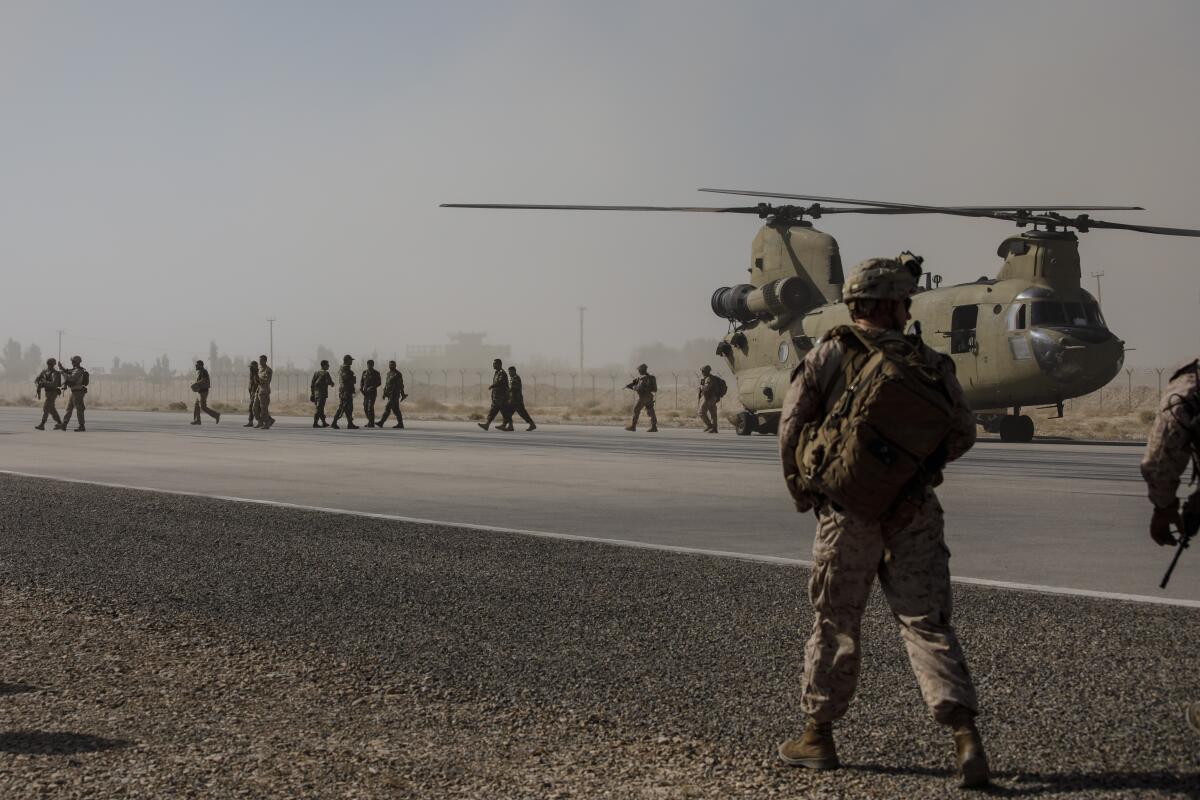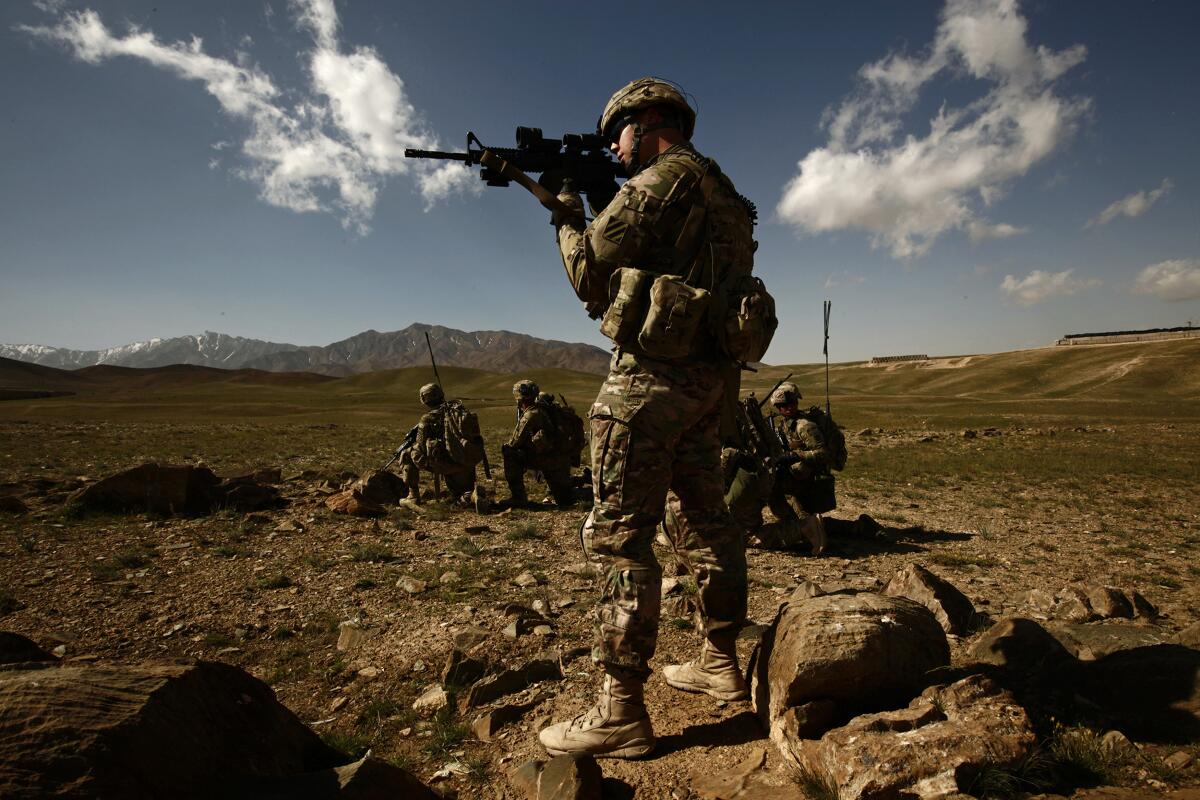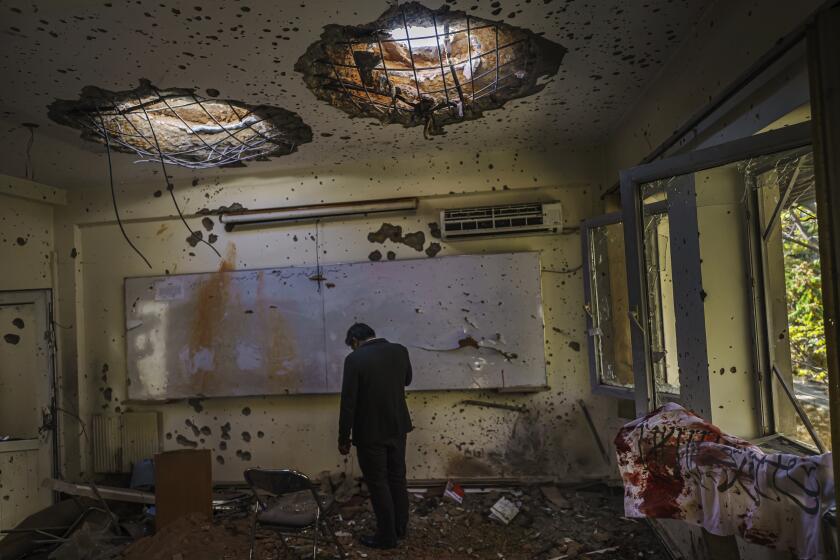Biden to announce plan to withdraw troops from Afghanistan by Sept. 11

WASHINGTON — President Biden is set to announce a plan Wednesday to withdraw all remaining troops from Afghanistan by Sept. 11, the 20th anniversary of the terrorist attacks that sparked the United States’ longest war.
The plan, which U.S. officials disclosed Tuesday, means that many of the few thousand troops in Afghanistan will remain after May 1, a deadline the Trump administration set last year in a deal with the Taliban.
But two decades after they arrived, U.S. troops appear all but certain to exit Afghanistan within five months, leaving the Afghan government to fight on largely alone against an enemy that has been gaining ground and that has balked at a U.S.-led push for a peace settlement.
The Taliban was driven out of Kabul, the Afghan capital, when the United States invaded in response to the Sept. 11, 2001, attacks by Al Qaeda, the militant group led by Osama bin Laden that had taken refuge in Afghanistan.
For Biden, the decision marks a final judgment that no military solution in Afghanistan is possible, despite more than 2,200 U.S. service members dead, more than 20,000 wounded and nearly a trillion dollars expended on the war; at the least, many tens of thousands of Afghan civilians have been killed in the conflict. Unless he switches course, Biden will achieve the exit from an unpopular war that eluded two predecessors.
The president believes “there is no viable end to the war — militarily viable end to the war — in Afghanistan,” White House Press Secretary Jen Psaki said Tuesday. “He’s had that view for some time now.”
U.S. troops are rushing to exit Afghanistan as the insurgency it never managed to defeat regains ground across much of the country.
Biden’s hopes that he could execute a face-saving departure in the first months of his administration by pulling off a diplomatic settlement of the conflict have largely evaporated, analysts say. Instead he has settled on one of the only options that remain: getting out soon, even if it’s messy and a blow to U.S. international standing.
“The goal is to have a U.S. withdrawal which is not embarrassing,” said Asfandyar Mir, an Afghan analyst at Stanford University. “They think they can pull out and try to manage this thing from afar.”
Rather than an unwinnable war in Afghanistan, Biden wants to focus “on the challenge of competition with China, on the challenge presented by the current and future pandemics,” and other international threats, according to a senior U.S. official who spoke on condition of anonymity at the request of the White House.
“We will reposition our [counter-terrorism] capabilities, retaining significant assets in the region to counter the potential reemergence of a terrorist threat to the homeland from Afghanistan,” the official said.
Officially there are 2,500 troops in Afghanistan, but that doesn’t count special operations forces and other units that rotate in temporarily and can increase the number to 3,500 or more. The U.S. withdrawal will begin this month and continue at the discretion of commanders until all forces are out before Sept. 11, the official said. Only a small contingent of Marines will remain at the U.S. Embassy in Kabul to provide security.
Almost all of the additional 8,500 foreign troops in Afghanistan from NATO allies and other countries are also likely to leave in coming months, officials said. At the war’s height in 2010, nearly 100,000 U.S. troops were stationed there.
The foreign troop departure will bring the looming risk that war-ravaged Afghanistan will descend further into chaos and civil war. With that, some critics charge, will come a renewed threat that Afghanistan will again become a haven for Al Qaeda and other militant groups. The U.S. exit will also leave Afghan President Ashraf Ghani and his government at risk.
On Tuesday, as U.S. officials were describing Biden’s withdrawal blueprint, the U.S. intelligence community was making public its annual assessment of global security threats, which concluded that the “Afghan government will struggle to hold the Taliban at bay if the coalition withdraws support.”
The thousands of U.S. contractors who provide support to Afghanistan’s military forces are also likely to depart. Army Gen. Austin “Scott” Miller, the top American commander in Kabul, warned recently that a rapid U.S. withdrawal would leave the Afghan armed forces without vital support, especially for its fledgling air force, which relies on contractors to maintain its planes and helicopters.
“When you start talking about removing our presence … certain things like air, air support and maintenance of that air support become more and more problematic,” Miller said in an interview in March.
Biden rebuffed recommendations from senior Pentagon commanders that U.S. troops remain indefinitely or that withdrawals come only when security conditions improve.
Fearful that a pullout could revive the Al Qaeda threat, Pentagon officials in the last two administrations have managed to delay a final pullout in part by arguing for a “conditions-based” withdrawal. But Biden rejected that approach, the senior U.S. official said.
“This is not conditions-based. The president has judged that a conditions-based approach, which has been the approach of the past two decades, is a recipe for staying in Afghanistan forever,” he said.
Administration officials have not given up hope of brokering peace talks between Afghan officials and the Taliban before U.S. troops depart, with the goal of creating an interim government that would map out a more peaceful future for the country. One reason for keeping at least a small troop contingent beyond May is the hope it will help maintain some stability while diplomatic efforts continue, officials have said.

But Taliban officials have been insistent that the United States and its allies needed to abide by the May 1 deadline.
Under the terms of the deal signed by the Trump administration — which did not include the Afghan government — the Taliban promised not to strike American forces and have largely stuck by that promise. The U.S. also agreed to restrict its combat operations for the last year, limiting itself to airstrikes in cases where Taliban fighters have threatened to overrun Afghan government troops.
The Taliban has said the cease-fire against foreign forces will end if Biden misses the withdrawal date.
A possible hint of the militants’ plans came last week when they fired a salvo of rockets at Kandahar air base, a once-sprawling installation in southern Afghanistan that U.S. troops have largely evacuated. No casualties were reported.
U.S. officials have warned Taliban officials in talks in Qatar that they will strike back if the militants renew attacks. It’s unclear whether Taliban officials have given tacit assurances that they will not target American troops on their way out, even after the deadline. Pentagon officials say they also worry that angry Afghan government security forces, with Taliban encouragement, could attack departing American personnel.
After May 1, the Taliban could feel compelled to resume attacks, even if only at a low level, to reassure its own supporters that it is not backing away from its demands that the U.S. depart, some officials warn.
“That’s a real date in the Taliban mind,” Miller said in the March interview in Kabul.
It’s also likely that Taliban will step up attacks on Afghan troops and encircle major cities, including Kandahar and Kabul, threatening to repel the government troops and carrying out car bombings and mortar attacks. Whether U.S. commanders will be free to come to the Afghans’ aid in that case is also unclear.
U.S. officials say they are still seeking Taliban agreement to reduce attacks in hopes of creating a climate for a peace settlement. Zalmay Khalilzad, the top U.S. envoy for Afghanistan, has been meeting with Taliban officials in Qatar and with Afghan officials in Kabul.
A formal invitation from Turkey to the Taliban and Afghan government officials for peace talks beginning April 24 was issued Tuesday. Taliban officials seemed to rule out joining the talks.
“Until all foreign forces completely withdraw from our homeland, the Islamic Emirate will not participate in any conference that shall make decisions about Afghanistan,” Mohammed Naeem, a Taliban spokesman in Qatar, said Tuesday on Twitter.
The U.S. announcement of an exit timetable is likely to only confirm the Taliban view that it has won the conflict against the United States, making a peace deal even more elusive.
The Taliban is seeking the release of its 7,000 prisoners held by the Afghan government and the lifting of United Nations sanctions on its leaders — demands that U.S. officials are hopeful, if met, could lead to a Taliban decision to reduce skyrocketing attacks on Afghan troops.
Even as they outlined their withdrawal plans amid worsening security, U.S. officials defended the gains achieved in Afghanistan in the last two decades, noting that a massive infusion of foreign aid has improved education and women’s rights and has reduced maternal mortality.
It is diplomacy and not military force that will ultimately protect Afghan citizens, preserve their human rights and protect the substantial gains made by long-repressed women and girls, the senior U.S. official said.
“A lot has changed in two decades,” the official said. “We will do all we can working with the international community to preserve those gains, but not with U.S. troops on the ground.”
Immediate reaction from lawmakers in Washington was mixed, with many questioning whether the withdrawal will sacrifice stability in Afghanistan.
Senate Minority Leader Mitch McConnell (R-Ky.), who opposed former President Trump’s previous deal with the Taliban, said removing military personnel would be a “grave mistake. It is a retreat and abdication of American leadership.”
Sen. Robert Menendez (D-N.J.), chair of the Senate Foreign Relations Committee, said he wanted to hear more from the Biden administration on the decision.
“The view is, we don’t have enough troops there to change the tide and make a difference, so if we are not going to do that, why keep the troops that are there and put them at risk; empower the Afghan security enforces even more, be ready to strike if we have a resurgence of Al Qaeda and company,” he said. “So I understand all of that thinking. I just am concerned that after so much blood and national treasure that we don’t lose what we were seeking to achieve.”
Times staff writer Jennifer Haberkorn contributed to this report.
More to Read
Get the L.A. Times Politics newsletter
Deeply reported insights into legislation, politics and policy from Sacramento, Washington and beyond. In your inbox three times per week.
You may occasionally receive promotional content from the Los Angeles Times.













